Quiz: What do these three songs have in common?
‘It Might As Well Rain Until September’ by Carole King (1962, peaked at #22 on the charts)
‘Jamie’, by Eddie Holland (1962, peaked at #30)
‘Who Put the Bomp (In the Bomp, Bomp, Bomp)’ by Barry Mann (1961, peaked at #7)
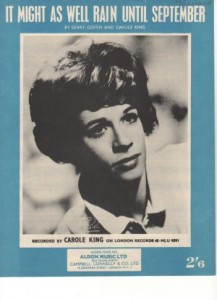 The 1950s didn’t end on December 31st, 1959 (a day on which absolutely nothing of note occurred other than a few really hip swingers celebrating the decade shift by dancing the cha-cha-cha), nor did the 1960s begin the next day (although Cameroon did gain its independence and Johnny Cash played his first free concert in a prison). I know. I was there (not in San Quentin; just, you know, ‘around’), albeit a wee ‘un. But I can testify that in 1961 and 1962 and even 1963, there were still plenty of 1950s around.
The 1950s didn’t end on December 31st, 1959 (a day on which absolutely nothing of note occurred other than a few really hip swingers celebrating the decade shift by dancing the cha-cha-cha), nor did the 1960s begin the next day (although Cameroon did gain its independence and Johnny Cash played his first free concert in a prison). I know. I was there (not in San Quentin; just, you know, ‘around’), albeit a wee ‘un. But I can testify that in 1961 and 1962 and even 1963, there were still plenty of 1950s around.
All I had to do was turn on WSAI, Cincinnati’s leading Hit Parade station, which informed my cultural landscape even more than Dobie Gillis, Alfred E. Newman, or the NL-champion Reds. Return with us now to those thrilling days of yesteryear as the Top 40 rides again!
The Top 40 was of course the dominant radio format of the 1950s–1980s. In later years it was the classic broadcast format, but it actually defined the early days of rock and roll, and thereby us babyboomers. George Lucas made the definitive nostalgic recreation of the era in 1973’s “American Graffiti”, a reconstruction as telling as clips of American Bandstand.
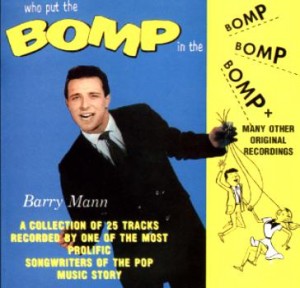 The music of the Top 40 was a wider mix than we tend to remember. #1 hits from 1959-61 included ‘The Chipmunk Song’ (David Seville), ‘The Battle of New Orleans’ (Johnny Horton), ‘Mack the Knife’ (Bobby Darin), ‘Theme from A Summer Place’ (Percy Faith), ‘Mr Custer’ (Larry Verne), ‘Wonderland by Night’ (Bert Kaempfert), ‘Calcutta’ (Lawrence Welk), ‘Wooden Heart’ (Joe Dowell), none of which are even remotely related to ‘rock & roll’.
The music of the Top 40 was a wider mix than we tend to remember. #1 hits from 1959-61 included ‘The Chipmunk Song’ (David Seville), ‘The Battle of New Orleans’ (Johnny Horton), ‘Mack the Knife’ (Bobby Darin), ‘Theme from A Summer Place’ (Percy Faith), ‘Mr Custer’ (Larry Verne), ‘Wonderland by Night’ (Bert Kaempfert), ‘Calcutta’ (Lawrence Welk), ‘Wooden Heart’ (Joe Dowell), none of which are even remotely related to ‘rock & roll’.
But the meat and potatoes of The Day was Brill Building-style hits, assembly-line products written by married-couple pairs of Jews (Ellie Greenwich and Jeff Barry, Barry Mann and Cynthia Weil, Gerry Goffin and Carole King); just-good-friends pairs of Jews (Burt Bacharach and Hal David, Jerry Leiber and Mike Stoller, Doc Pomus and Mort Shuman, Neil Sedaka and Howard Greenfield); famous individual Jews (Phil Spector, Neil Diamond, Paul Simon), and lesser-known Jewish luminaries – Bert Berns (‘Twist and Shout’, ‘Piece of My Heart’), Artie Kornfield (‘Up, Up and Away’, the brains behind the Woodstock festival and movie), Shadow Morton (‘Remember [Walking In The Sand]’, ‘Leader of the Pack’).
Meanwhile, back in Detroit, Berry Gordy was demonstrating how members of the Negro (that was the PC term of the day) persuasion could put together a writing/producing/recording hit factory. From 1961 to 1971, Motown had 110 Top Ten hits, most of which were written and produced by Holland-Dozier-Holland, i.e., Lamont Dozier and brothers Brian and Eddie Holland. Motown’s house band, later labeled The Funk Brothers, played on more #1 hits than the Beach Boys, the Rolling Stones, Elvis Presley, and the Beatles combined.
If you’ve been paying attention, you’ve cracked our quiz. Eddie Holland, Barry Mann, and Carole King were young factory-line songwriters from the early 1960s who got just a little envious of the acned stars grabbing their goodies, and tried recording themselves. Unsuccessfully. Raving flops, all three. Listen to the sound of no one applauding. All three eventually became trillionaires from their royalties, but I’ll betcha their failures as recording artists (well at least for the guys) still rankle.
Eddie Holland, Motown
Eddie Holland. Why bother singing? From 1963 to 1967, Holland-Dozier-Holland had 27 Top Ten hits!!!
|
Year |
Song title |
Artist |
US |
| 1963 | “(Love Is Like a) Heat Wave” | Martha and the Vandellas |
4 |
| “Mickey’s Monkey” | The Miracles |
8 |
|
| “Quicksand” | Martha and the Vandellas |
8 |
|
| 1964 | “Where Did Our Love Go” | The Supremes |
1 |
| “Baby Love” | The Supremes |
1 |
|
| “Come See About Me” | The Supremes |
1 |
|
| “How Sweet It Is (To Be Loved by You)” | Marvin Gaye |
6 |
|
| 1965 | “Stop! In the Name of Love” | The Supremes |
1 |
| “Nowhere to Run” | Martha and the Vandellas |
8 |
|
| “Back in My Arms Again” | The Supremes |
1 |
|
| “I Can’t Help Myself (Sugar Pie Honey Bunch)” | Four Tops |
1 |
|
| “It’s the Same Old Song” | Four Tops |
5 |
|
| “I Hear a Symphony” | The Supremes |
1 |
|
| 1966 | “My World Is Empty Without You” | The Supremes |
5 |
| “Love Is Like an Itching in My Heart” | The Supremes |
9 |
|
| “You Can’t Hurry Love” | The Supremes |
1 |
|
| “Reach Out I’ll Be There” | Four Tops |
1 |
|
| “You Keep Me Hangin’ On” | The Supremes |
1 |
|
| “Standing in the Shadows of Love” | Four Tops |
6 |
|
| “I’m Ready for Love” | Martha and the Vandellas |
9 |
|
| 1967 | “Love Is Here and Now You’re Gone” | The Supremes |
1 |
| “Baby I Need Your Loving” | Johnny Rivers |
3 |
|
| “Jimmy Mack” | Martha and the Vandellas |
10 |
|
| “Bernadette” | Four Tops |
4 |
|
| “The Happening” | The Supremes |
1 |
|
| “Reflections” | The Supremes |
2 |
|
| “In and Out of Love” | The Supremes |
9 |
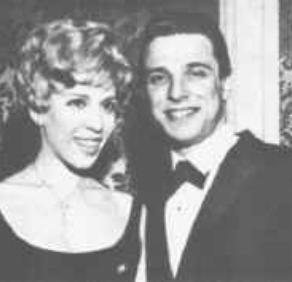
L to R: Cynthia Weil, Barry Mann
Barry Mann
Barry Mann not only wrote ‘He’s Sure the Boy I Love’ and ‘Uptown’ (The Crystals), ‘Hungry’ and ‘Kicks’ (Paul Revere & the Raiders), ‘I’m Gonna Be Strong’ and ‘Looking Through the Eyes of Love’ (Gene Pitney), ‘(Walking) In the Rain’ (The Ronettes), ‘It’s Getting Better’ (Cass Elliot), ‘Just a Little Lovin’ [Early in the Morning]’ (Dusty Springfield), ‘On Broadway’ and ‘Saturday Night at the Movies’ (The Drifters), ‘Only in America’ (Jay and the Americans), and ‘We Gotta Get out of This Place’ (The Animals). He also wrote the most-played single of all time (‘You’ve Lost That Loving Feeling’ with Phil Spector), and is still married to his lyricist Cynthia Weil after all these years. Two very remarkable achievements, indeed.
Carole King
And Carole King. Born Carol Klein in 1942, she was the muse for Neil Sedaka’s ‘Oh! Carol’. In college she was good buddies with Paul Simon. At 18, just a little pregnant, she married Gerry Goffin. In addition to two daughters, together they produced:
|
Year |
Song |
Original artist |
U.S. |
| 1960 | “Will You Love Me Tomorrow” | Shirelles |
1 |
| 1961 | “Take Good Care of My Baby” | Bobby Vee |
1 |
| “Some Kind of Wonderful” | The Drifters |
32 |
|
| “Halfway to Paradise” | Tony Orlando |
39 |
|
| “Every Breath I Take” | Gene Pitney |
42 |
|
| “Walkin’ with My Angel” | Bobby Vee |
53 |
|
| 1962 | “Chains” | The Cookies |
17 |
| “Keep Your Hands Off My Baby” | Little Eva |
12 |
|
| “The Loco-Motion” | Little Eva |
1 |
|
| “He Hit Me (It Felt Like a Kiss)” | The Crystals | ||
| “Go Away Little Girl” | Steve Lawrence |
1 |
|
| “Point Of No Return” | Gene McDaniels |
21 |
|
| “It Might As Well Rain Until September” | Carole King |
22 |
|
| 1963 | “Don’t Say Nothin’ Bad (About My Baby)” | The Cookies |
7 |
| “Old Smokey Locomotion” | Little Eva |
48 |
|
| “I Can’t Stay Mad At You” | Skeeter Davis |
7 |
|
| “Hey Girl” | Freddie Scott |
10 |
|
| “One Fine Day” | The Chiffons |
5 |
|
| “Up on the Roof” | The Drifters |
5 |
|
| 1964 | “I Can’t Hear You No More” | Betty Everett |
66 |
| “I’m into Something Good” | “Earl-Jean” McCrea |
38 |
|
| “Oh No Not My Baby” | Maxine Brown |
24 |
|
| 1965 | “Don’t Forget About Me” | Barbara Lewis |
91 |
| 1966 | “Don’t Bring Me Down” | The Animals |
12 |
| “Road to Nowhere” | Carole King |
– |
|
| “Goin’ Back” | Dusty Springfield |
– |
|
| “I Can’t Make It Alone” | P.J. Proby |
– |
|
| 1967 | “Pleasant Valley Sunday” | The Monkees |
3 |
| “(You Make Me Feel Like) A Natural Woman” | Aretha Franklin |
8 |
|
| 1968 | “Porpoise Song” | The Monkees |
62 |
| “Wasn’t Born to Follow” | The Byrds | ||
| 1970 | “Hi-De-Ho (That Old Sweet Roll)” | Blood, Sweat & Tears |
14 |
King and Goffin divorced in 1968 (in the beginning she consulted him about the music she was writing, but she eventually lost touch with him “because of his declining mental health and the effect it had on their children.”)
She formed a band called The City with Danny Kortchmar and Jim Gordon, which made one pretty lousy album (“Now That Everything’s Been Said”), even though it included the original versions of BS&T’s ‘Hi-De-Ho (That Old Sweet Roll)’ and The Byrds’ theme song from the movie “Easy Rider”, ‘Wasn’t Born to Follow’. In 1970 she made her first solo album, “Writer”, which contained the fine ‘Going Back’ (The Byrds) and the classic ‘Up on the Roof’ and studio support from James Taylor. But alas, it also flopped.
Undaunted, in 1971, she recorded an album of new songs such as ‘I Feel the Earth Move’, ‘So Far Away’, ‘It’s Too Late’, ‘You’ve Got a Friend’ (written for and about James Taylor), and her oldies but greaties ‘Will You Still Love Me Tomorrow’ and ‘Natural Woman’. The rest, as they say, is history. But you and I know that history actually started ten years earlier with her first recording, our nostalgic Song of The Week, ‘It Might as Well Rain Until September’.
If you enjoyed this posting, you may also like:
182: The Shirelles, ‘Will You Love Me Tomorrow’
234: Carole King, ‘Up On the Roof’ (Live, 1971)
023: Tommy Edwards, ‘It’s All In the Game’
028: Smokey Robinson & The Miracles, ‘The Tracks of My Tears’
042: Leiber & Stoller, ‘Yakety Yak’ (The Coasters)
034: Dionne Warwick, ‘Walk On By’ (Burt Bacharach)

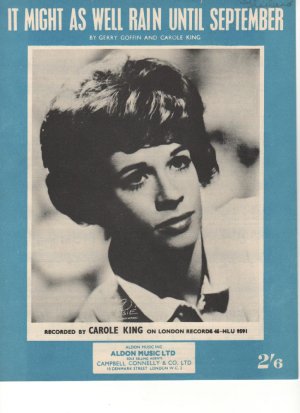
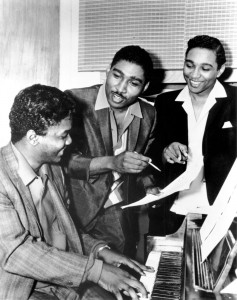
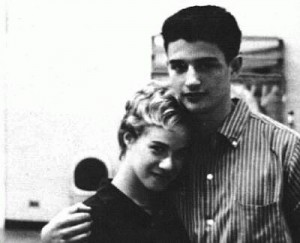
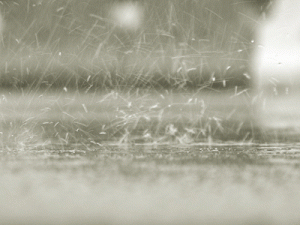
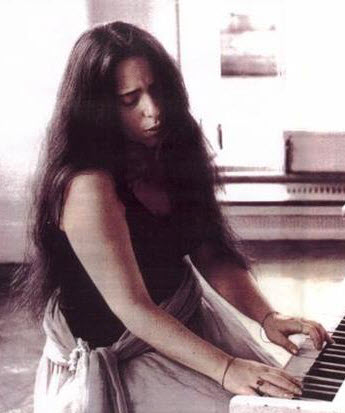
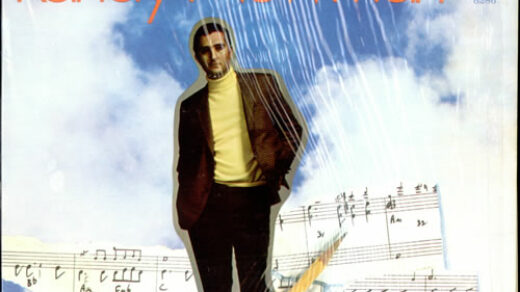

How apt for our rainy day today – and what a horrible song! Fascinating to hear about Carole – I only knew her from her hits.
from Paul Jay:
I have long been struck by the prolific fecundity of Jewish musicians – upon which you touch here.
A year or so ago we were invited to a friend’s son’s Bar Mitzvah, and since the young man has some musical tendencies, for a gift on the occasion I managed to find a clean copy of the (now out of print) book by Darryl Lyman ‘Great Jews in Music’ which I had browsed extensively some years ago in a Baltimore bookstore. To accompany the book I collected onto a couple of CDs tracks of personalities mentioned in the book, (and some who should have been!). I doubt it will be his most exciting or appreciated gift, but in years to come (if CD players still exist) he may dip into it further!
The spectrum of influence is staggering.
Makes me jealous of you folks!!
One day maybe they will isolate a stretch of DNA that causes this and features prominently in the Ashkenazy line or something like that!
Answering Paul: A complete non-sequitur: I had the opportunity to sing in the chorus of a professional concert production of Porgy & Bess. I read about Gershwin’s research in writing the music. I asked the soprano, a black British transplant to America specializing in singing Bess, whether she felt this was Black or Jewish music. She thought hard for a minute, then answered “Black”. To me it still sounds very Jewish. It seems to me that popular music is about 70% the story of Jews writing and producing music that blacks are performing.
Here’s another Yiddishe Maidella who brought a richness to this celebrated song, and made it a hit in England
https://youtu.be/2SK-z54L7Vc